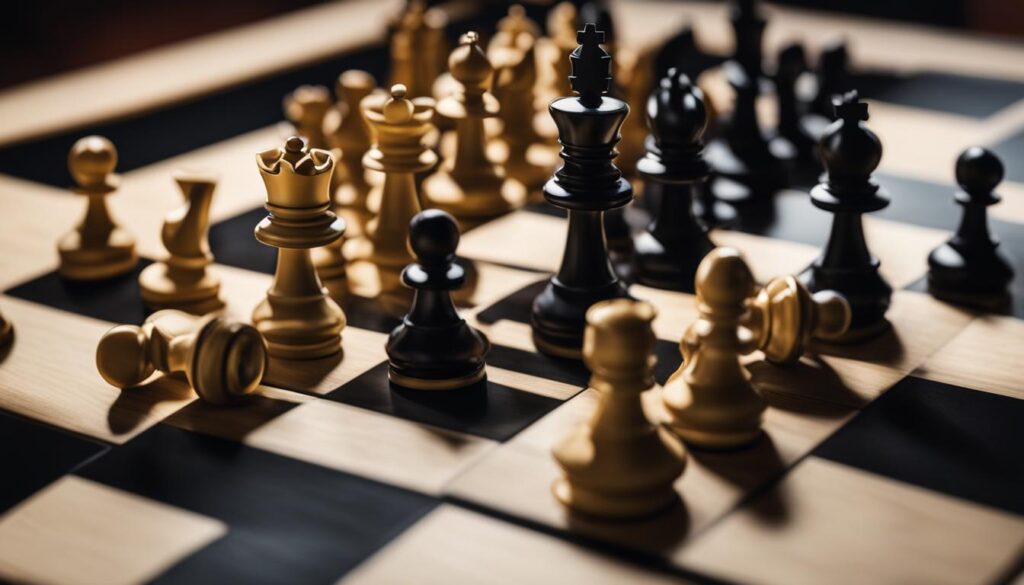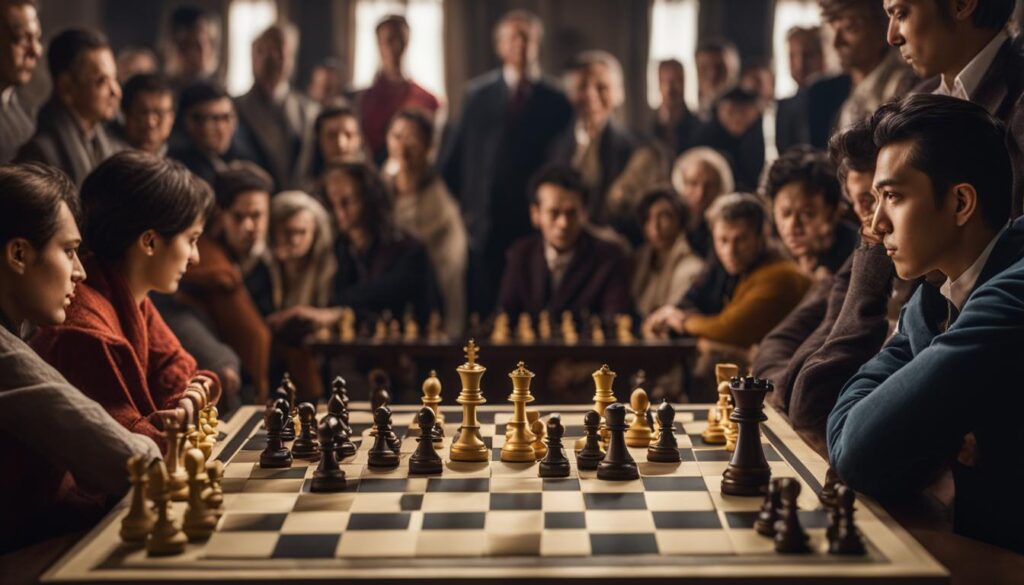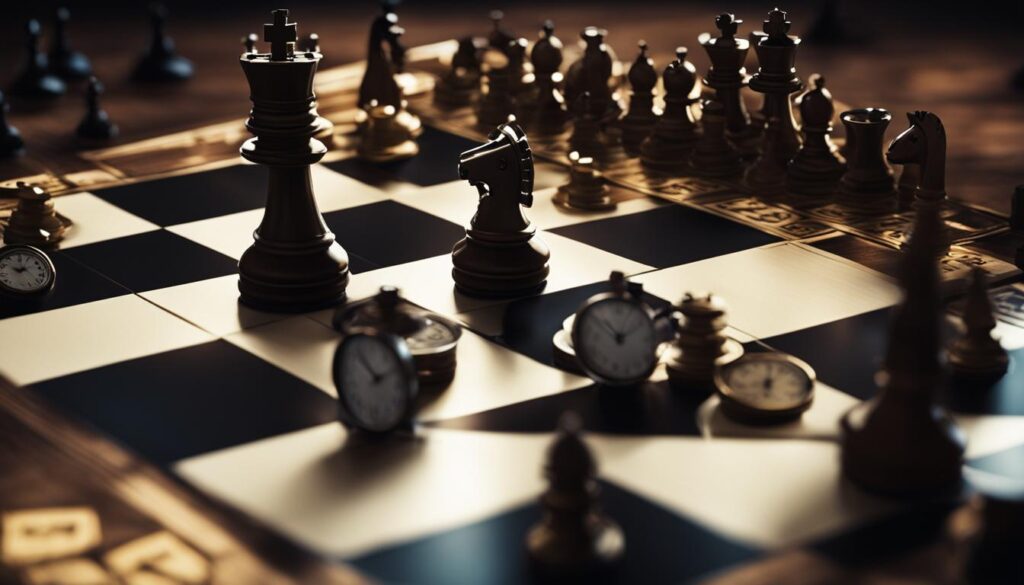We may earn money or products from the companies mentioned in this post.
Chess is a game of strategy that has been played for centuries, and it continues to captivate players of all ages and skill levels. To truly master the game of chess, it is essential to understand the importance of chess rule enforcement.
Whether you are playing a casual game with friends or competing in a tournament, understanding the basic chess rules and regulations is crucial for playing effectively. Not only does it ensure fair play, but it also helps you develop a better understanding of strategic moves, positional play, and game dynamics.
In this section, we will explore the significance of chess rule enforcement and provide strategies for effectively enforcing chess rules during a game. By the end of this section, you will have a better understanding of the importance of chess rules, and how they impact your gameplay.
Key Takeaways
- Chess rule enforcement is essential for mastering the game of chess.
- Understanding the basic chess rules and regulations is crucial for playing effectively.
- Enforcing chess rules ensures fair play and helps you develop a better understanding of strategic moves.
- In the next sections, we will discuss how to familiarize yourself with the official chess rule book, the role of chess referees and fair play, and strategies for effective chess rule enforcement.
Familiarize Yourself with Chess Rule Book and Regulations
To become knowledgeable about the rules of chess, you must first familiarize yourself with the official chess rule book and tournament regulations. These resources lay out the specific guidelines for playing the game, and they are essential for any player looking to enforce the rules effectively.
There are various resources available to players looking to learn about chess rules, including books, online materials, and in-person chess classes. However, the official chess rule book is the most reliable and comprehensive source of information.
The Chess Rule Book
The World Chess Federation (FIDE) publishes the official rule book for the game of chess. The current edition is available online and has been translated into multiple languages to accommodate international play.
The rule book covers all aspects of the game, including how to set up the board, how each piece moves, how to castle, how to capture pieces, and how to win the game. It also discusses specific scenarios that may arise during gameplay, such as draws and time controls.
Tournament Regulations
For players participating in tournaments, it is essential to also be familiar with the tournament regulations. These regulations outline the rules for specific tournaments, including details on how to register, entry fees, and tournament schedules. They may also cover the specific rules for timed games, blitz games, and other variations of chess.
It is important to note that different organizations and tournaments may have varying regulations. Players should review the regulations carefully before participating to ensure that they are following the appropriate guidelines.
Benefits of Familiarizing Yourself with the Rules
Becoming familiar with the chess rule book and tournament regulations is crucial for any player looking to play within the established rules and regulations. By understanding the guidelines, players can ensure fair play and ethical conduct during games and tournaments. Additionally, players who are knowledgeable about the rules are better equipped to identify and address rule violations.
Pro Tip: Keep a copy of the official rule book and tournament regulations handy during games and tournaments for quick reference. This will help you stay focused and maintain a fair and competitive playing environment.
The Role of Chess Referees and Fair Play
Chess referees play a vital role in ensuring fair play and enforcing the rules of the game. They are responsible for monitoring games and ensuring that players adhere to the established rules and regulations.
In official tournaments, chess referees are typically assigned to each game to oversee the players and ensure fair play throughout the entire event. They are trained to recognize common rule violations and take appropriate action to address them. This can include issuing warnings, assessing penalties, or even forfeiting the game if necessary.
Chess referees are also responsible for resolving disputes between players and ensuring that the game proceeds in a timely and orderly manner. They must remain impartial and make decisions based solely on the rules of the game, without bias towards either player.
Additionally, fair play is an essential aspect of chess culture. Players are expected to conduct themselves with integrity and abide by the principles of sportsmanship. This includes showing respect for opponents, following the rules, and refraining from unsportsmanlike behavior.
“Chess is a game where the rules are essential to the integrity of the game. Without proper rule enforcement, the game loses its strategic essence.”
By upholding the principles of fair play and working closely with chess referees to ensure rule enforcement, players can maintain an environment of integrity and sportsmanship on and off the chessboard.
Strategies for Effective Chess Rule Enforcement
Enforcing chess rules is crucial for maintaining a fair and competitive playing environment. To effectively enforce the rules, it is important to have a strategy in place. Below are some strategies for effective chess rule enforcement:
Understand Common Chess Violations
Being familiar with common chess violations is essential for effective rule enforcement. Some examples include:
- Moving a piece to an illegal square
- Touching a piece without intending to move it
- Intentionally distracting or disturbing your opponent
By understanding these violations, you can easily identify them during a game and take appropriate action.
Communicate Clearly
Clear communication is key to effective rule enforcement. If you suspect a violation has occurred, clearly and calmly inform your opponent and explain the rule that has been violated. Ensure that you are speaking in a respectful tone and are not accusing or aggressive.
Address Violations Promptly
Addressing violations promptly is crucial to maintaining a fair and competitive playing environment. If you believe a violation has occurred, take action immediately. If you wait too long to address the issue, it may become more difficult to enforce the rule.
Remain Consistent
Consistency is necessary for effective rule enforcement. Ensure that you are enforcing the rules consistently throughout the game and not selectively targeting certain violations. By remaining consistent, you establish a level playing field and promote fair play.
Lead by Example
Finally, leading by example is a powerful strategy for effective rule enforcement. Ensure that you are following the rules and regulations yourself and not engaging in any violations. By modeling good behavior, you encourage your opponent to do the same.
Enhancing Your Skills through Rule Enforcement
Enforcing chess rules is not just about playing within the established guidelines. It also provides an opportunity to enhance your skills as a player. By adhering to the rules, you develop a better understanding of the game’s strategic moves, positional play, and overall dynamics. This knowledge can help you anticipate your opponent’s next moves and make more informed decisions during the game.
Chess rule enforcement strategies can be used as a tool for improving your game. Here are some tips for effectively enforcing the rules while also enhancing your skills:
- Observe and analyze: Pay attention to your own moves and those of your opponent. Analyzing each move can help you identify any potential violations and learn from mistakes.
- Know the rules: Make sure you’re familiar with all the chess rules before you start playing. This will help you enforce them properly and avoid committing any violations yourself.
- Communicate effectively: If you notice a violation, communicate it to your opponent in a clear and respectful manner. This will help avoid any misunderstandings or conflicts during the game.
- Encourage fair play: Uphold the values of fair play and ethical conduct during the game. Set a positive example by playing within the rules and treating your opponent with respect.
- Learn from your mistakes: If you do make a mistake and commit a violation, learn from it and make sure it doesn’t happen again. Use it as an opportunity to improve your game and grow as a player.
By incorporating these chess rule enforcement strategies into your game, you can not only ensure fair play but also improve your skills and knowledge of the game. Remember to always play within the rules and enjoy the beauty and strategy of this timeless game.
Conclusion
Mastering the game of chess requires more than just knowing the moves and strategies. It also involves having a solid understanding of the rules and regulations that govern the game. Through this article, we have explored the importance of chess rule enforcement in elevating your game and increasing your chances of success on the chessboard.
By familiarizing yourself with the official chess rule book and tournament regulations, you will be better equipped to play within the established rules when competing. Additionally, understanding the role of chess referees in ensuring fair play and ethical conduct is crucial to maintaining a competitive playing environment.
Strategies for Effective Chess Rule Enforcement
Enforcing the rules during a game can be challenging, but having a strategy in place can help. By identifying common chess violations and knowing how to address them, you can prevent rule infractions and maintain a fair playing environment. Additionally, playing within the rules can help you develop a better understanding of strategic moves, positional play, and overall game dynamics.
Enjoy the Beauty of Chess
Remember to always play within the rules and remember that the ultimate goal of chess is to enjoy the game’s beauty and challenge. By applying the strategies for effective rule enforcement discussed in this article, you can embrace the true spirit of chess and become a better player.
FAQ
What are the basic chess rules?
The basic chess rules include how the pieces move, how to capture an opponent’s pieces, and the objective of the game, which is to checkmate the opponent’s king.
Where can I find the official chess rule book?
The official chess rule book can be found on the website of the World Chess Federation (FIDE) or through various chess organizations.
What happens if a player violates a chess rule during a game?
If a player violates a chess rule, the opponent or a designated referee can raise an objection and take appropriate action, such as imposing penalties or making necessary corrections.
What are some common chess rule violations?
Common chess rule violations include illegal move, touch-move rule violation, piece movement errors, and failure to promote a pawn when reaching the opposite end of the board.
How do chess referees enforce the rules?
Chess referees enforce the rules by monitoring the game, ensuring fair play, and intervening when necessary to address rule violations or disputes between players.
How can rule enforcement enhance my chess skills?
Enforcing chess rules helps you develop a better understanding of strategic moves, positional play, and overall game dynamics, which can contribute to your growth as a chess player.
Affiliate Disclosure: This post may contain affiliate links. If you purchase through our link, we may receive a small commission, but at no additional cost to you. For more information, please see our Disclosure statement.



